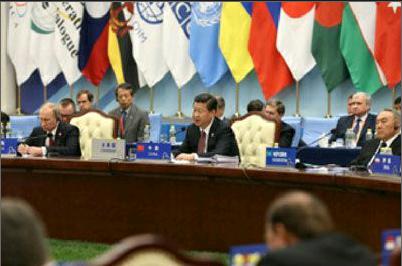SECURING A NEW CONCEPT
2014-06-17ByYuLintao
By+Yu+Lintao

Asia appears to be ushering in the first real security platform involving nearly the whole region. Although the Conference on Interaction and Confidence Building Measures in Asia (CICA) has been in existence for more than 20 years, its fourth summit recently held in Shanghai attracted extraordinary attention worldwide with the unprecedented participation of leaders and officials from 46 countries and international organizations.
At the summit, Chinese President Xi Jinping expounded a new concept of security in Asia, proposing to advocate common, comprehensive, cooperative and sustainable security. Xi stated that “security problems in Asia should be solved by Asians themselves who are able to achieve regional peace and stability through cooperation.”
Observers said the latest summit reminds the world that Asia is not only a dynamic continent with thriving economic growth but also rife with simmering tensions, demanding regional security cooperation architecture for which CICA can act as an effective platform. They added that Chinas recent series of diplomatic moves show that as both an economic and political power, the nation has become more active in the world arena under its new leadership.
A relevant concept
Observers claimed that the establishment of a new type of security concept in Asia is the chief challenge under the current regional security situation.
With the rapid economic growth of the region, the security dilemma of Asia is also a growing issue. From the Syrian crisis to the Israeli-Palestinian feud; from the South China Sea disputes to the nuclear issues on the Korean Peninsula and in Iran; from conventional security issues to non-traditional ones such as terrorism, extremism and crossborder crimes. Asia is confronted with a slew of threats to safety and stability. The security problems are increasingly impeding the development of the region.
“Compared with its booming economy, security cooperation is no doubt the short slab of Asia. So far, there is no real pan-Asian security cooperation mechanism,” said Shi Ze, a senior research fellow with the China Institute of International Studies (CIIS).
Shi said the current security challenges facing Asia are all-round and multi-layered—some are left over from history, some stem from modern geopolitical rivalries and some are even caused by interference from outside powers. He claimed that only common security can help to break the security dilemma of the region, thus requiring a new security concept of Asia featuring commonality, comprehensiveness and cooperation in order to serve the interests of all regional countries.
In an interview with Shanghai-based Oriental Morning Post, Fazal Rahman, Director of Pakistani think tank Strategic Studies Institute Islamabad, said the rapidly developing Asia is facing multiple challenges; meanwhile, the “pivot to Asia” strategy of the United States has further complicated regional security.
Rahman said that with Washingtons “pivot to Asia,” an alarming kind of quasi-Cold War and quasi-alliance mindset is on the rise in Asia. Under such circumstances, Rahman claimed it is necessary to equip the CICA with a more extensive platform for security cooperation to reduce risks.
Yang Jin, a researcher on international security with the Chinese Academy of Social Sciences (CASS), echoed Rahmans viewpoint.
Yang told Beijing Review that the United States rebalancing strategy in the AsiaPacific has further complicated the situation in the region, sending wrong signals to countries like Japan and the Philippines that have led to antagonism. These countries tend to neglect diplomatic efforts as they believe they can rely on their alliance with the superpower to bolster their territorial and maritime claims.
“The complicated traditional territorial disputes and non-traditional security problems in Asia have made security issues a core concern of all regional parties,” said Yang.
According to Yang, the security concept was first raised by China in 1995 during meetings with Southeast Asian countries.
In addition, Yang said, many security issues of Asia actually have not been decided by Asians since the collapse of the bipolar system at the end of last century. For instance, the Iraq wars, the situation in Afghanistan, the Iran and Korean Peninsula nuclear issues are all dominated by powers outside the region.
The new security concept, which proposes that Asian security problems eventually be solved by Asians, conforms to the common interests of Asia and reflects the demand of Asian people for international political democracy, said Yang.
Li Xin, Director of the Center for Russian and Central Asian Studies at the Shanghai Institutes for International Studies (SIIS), noted that China believes the worsening regional security situation is affecting its development. Thus, China needs to contribute its own efforts to cultivate a peaceful and stable environment for development.
Cooperation over alliance
In his keynote speech at the CICA Summit, President Xi proposed making the CICA a security dialogue and cooperation platform that covers the whole of Asia.
Xi said, “No country should seek absolute security of itself at the expense of others... We cannot just have security for one or a few countries while leaving the rest insecure. A military alliance which is targeted at a third party is not conducive to common regional security.”
Although the Cold War ended more than 20 years ago, the Cold War mentality has not diminished along with it. The traditional security concept emphasizes confrontation and alliances such as NATO and Washingtons relationships with Japan, Australia and the Philippines. These traditional alliance systems are all characterized by Cold War thinking and exclusiveness.
Qu Xing, President of the CIIS, said in sharp contrast to the decades-old security scheme based on the Cold War mentality, the new concept addresses Asias unique challenges shaped by its historical grievances, current tensions and potential risks.
“The new security concept proposed by Xi is keeping pace with the times,” said Yang. “One cannot deal with the security problems in the 21st century with the outdated thinking of the Cold War and zero-sum games.”
Yang also noted that as the new security concept stresses cooperation, it does not exclude other countries outside the region, including the United States. Asia welcomes the United States, which is an observer of the CICA, to play a positive role in Asian security issues.
In interviews with Chinese media, Azimova Sarvaroy, Deputy Director of the National Information Agency of Tajikistan, said he agrees with Xis judgment that peace, development and mutually beneficial cooperation are the main trends in the region. Jointly building a shared and win-win road for Asian security is necessary, he added.
Lee Young Ju, Director of South Koreas China Political, Economic and Cultural Academy, told the media that the “common, comprehensive, cooperative and sustainable” Asian security concept, proposed by Xi, fits with the times while meeting the common interests of countries in Asia. It reflects the Asian awareness, as it considers the demands of various countries in Asia and bears a practical significance for the settlement of hotspot issues in the region, including nuclear issues.
Observers noted that although one meeting or a new concept by itself cannot be the answer to all questions, the CICA Summit showed that Asian countries have the intention to seek consensus on Asian security with the release of a joint declaration.
“The effect of the CICA consensus cannot be immediate, but it is very possible that Asian countries will take quick action to jointly fight against terrorism,” said Yang.
Observers said the new security concept for the continent would also be helpful in accelerating economic development, reducing the gap between the rich and the poor and making people prosperous and countries strong.
Qu of the CIIS noted that all parties have applauded the idea of creating lasting security through sustainable development, which President Xi stressed in his speech. The idea also provides a framework under which Asia can aspire to its revival based on economic prosperity, stability and cooperation.
Li of the SIIS claimed that the new security concept on Asia can provide opportunities for promoting regional economic cooperation.
Li said the theme of the CICA highly matches the Silk Road Economic Belt and the 21st Century Maritime Silk Road strategies China recently raised. The two initiatives have become an important driving force for economic cooperation among CICA members.
Assuming a larger role
The Shanghai summit is the first CICA leadersmeeting China has held. Analysts claimed that the event hints that China is ushering in a new stage of diplomacy.
“China has successfully hosted several large international forums on the economy before, but never such a large-scale security forum, which doesnt match Chinas position as the worlds second largest economy,” said Li.
Li added that as the largest regional economic power in Asia, Chinas actions should match its new status, including assuming larger responsibility for promoting regional security and development.
Yang of the CASS said that the final declaration reached at the CICA Summit shows that the event has been successful.
The CICA has provided an important opportunity for China to promote multilateral diplomacy at home, Yang added.
In addition to the CICA Summit, China will host the APEC Economic Leaders Meeting in November in Beijing.
Yang said, “We have noticed the new changes of Chinas diplomacy. Under the new generation of leadership, China is becoming more active diplomatically and is more willing to increase its voice on the world stage.”
Highlights of the Shanghai Declaration
In a declaration issued on May 21 following the two-day CICA Summit in Shanghai, CICA members:
—acknowledged that they share common interests and security concerns, agreeing that no country can stay immune in the face of security problems
—reiterated the collective desire of all countries to carry forward the spirit of solidarity, cooperation and mutual assistance, respect each others sovereignty, and seek common development and progress
—pledged that no state should strengthen its security at the expense of other statessecurity, emphasizing that no state, group of states or organization can have pre-eminent responsibility for maintaining peace and stability
—resolved to respect each others sovereignty, independence and territorial integrity as well as the inviolability of internationally recognized borders, and to refrain from the threat or use of force against the territorial integrity or political independence of any state in any manner inconsistent with the principles and purposes of the UN Charter
—agreed to uphold the resolution of disputes by peaceful means, and not to interfere in the internal affairs of states, rejecting the use of double standards in international affairs
—vowed to advance extensive dialogues across cultures, civilizations and faiths, as well as to promote regional connectivity through people-to-people contacts
(Source: Xinhua News Agency)
